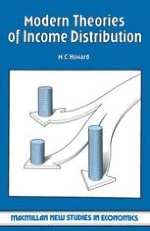1979 | OriginalPaper | Chapter
Accumulation and Distribution: a Neoclassical Theory
Author : M. C. Howard
Published in: Modern Theories of Income Distribution
Publisher: Macmillan Education UK
Included in: Professional Book Archive
Activate our intelligent search to find suitable subject content or patents.
Select sections of text to find matching patents with Artificial Intelligence. powered by
Select sections of text to find additional relevant content using AI-assisted search. powered by
The processes by which capital is accumulated and their consequences have been of central concern to economic theorists of all schools of thought: Classical, Marxian, Neoclassical and Keynesian. The reason is not difficult to understand. A distinguishing characteristic of the capitalist form of economic organisation, compared with those of its predecessors, has been its ability to constantly expand and transform the means of production. Consequently it has not been unreasonable for economists to presume that an understanding of capitalist economies requires that this phenomenon of accumulation be given a prime place in analysis. Furthermore, theoretical problems of income distribution have generally been considered to be intimately connected with those of accumulation. And again, the reason is straightforward. Capital accumulation is associated with savings from incomes. If there is full employment of resources, investment requires savings. Economic agents differ in their tastes for current consumption. Thus it can be argued that an analysis of distribution must be involved with any analysis of the rate of accumulation. Also, since the process of accumulation changes the supplies of the factors of production, it is likely to have significant effects on the prices of such factors, and thus on the distribution of income of those who own them.
